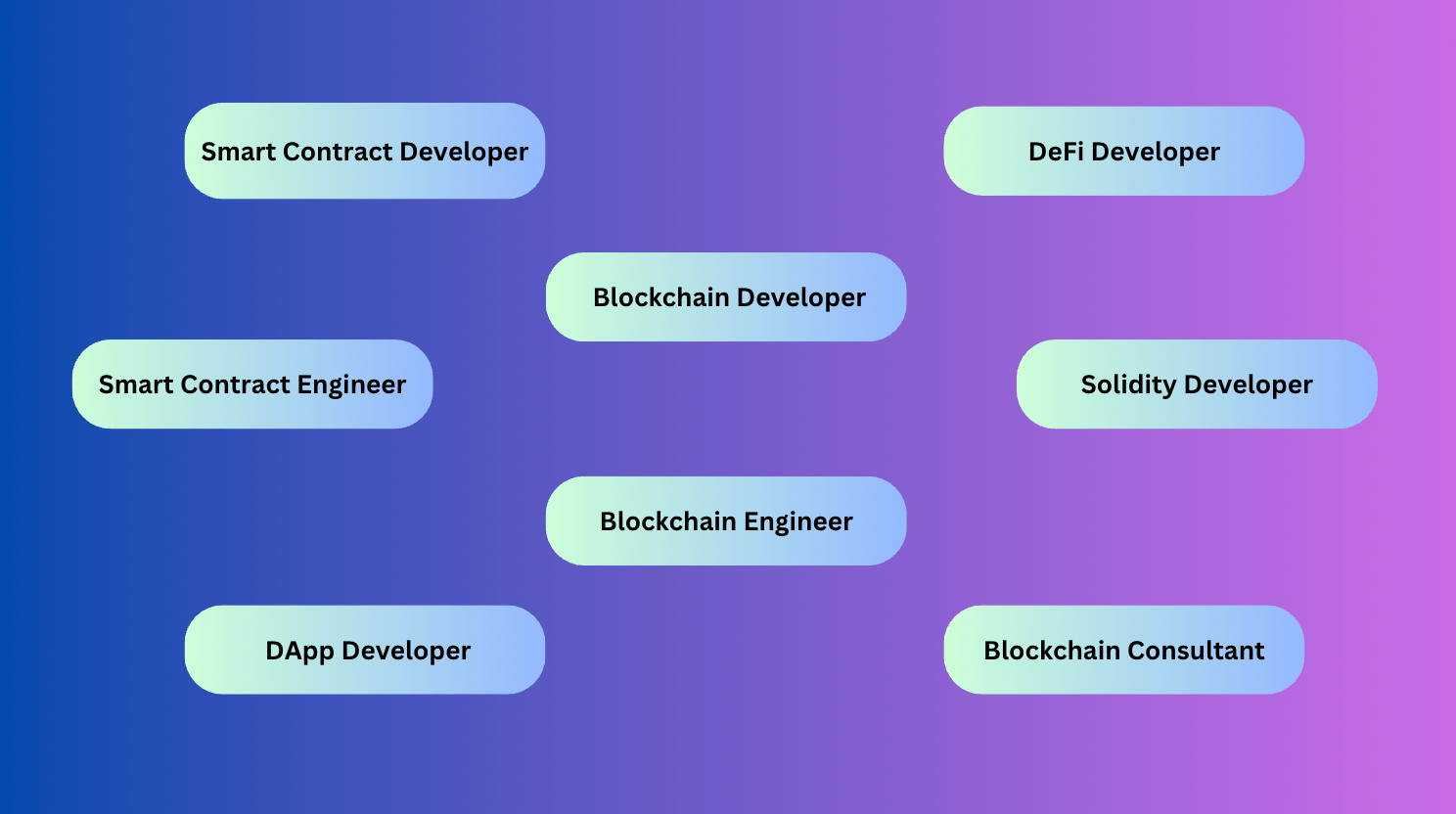How to Become a Smart Contract Developer [Salary, Jobs, Courses]
![How to Become a Smart Contract Developer [Salary, Jobs, Courses]](/v3/img/containers/blog_main/cloud_computing.jpg/5982b1adf933064618994915989c8491/cloud_computing.jpg?id=1739046670)
Smart contracts have revolutionized traditional contracts by reshaping how we execute and enforce agreements, powering decentralized applications DApps, decentralized finance (DeFi), and more. And with rising adoption, smart contract developers are in growing demand.
This guide will look into how to become a smart contract developer; we define smart contracts and delve into what smart contract developers do. We explore how to land a smart contract developer job, a smart contract developer salary, and the best courses you can take.
#What is a smart contract?
A smart contract (SC) is a digital contract that runs on blockchain technology and utilizes a decentralized and distributed ledger system (DLT). It automatically enforces agreed-upon actions when they meet the established conditions. Smart contracts act as digital protocols that facilitate, verify, or enact the negotiation or performance of an agreement.
#What does a smart contract developer do?
A smart contract developer designs, codes, and deploys self-executing contracts on blockchain platforms. They use programming languages like Solidity to create secure and automated agreements. The smart contract developer role involves:
- Understanding business requirements;
- Implementing the logic of the contract;
- Ensuring its functionality and security;
- Test, debug, and maintain smart contracts throughout their lifecycle.
#What is smart contract development?
Smart contract development is creating, coding, testing, and deploying self-activating contracts on a distributed ledger technology (DLT) network. It is the process of designing and implementing the logic, rules, and conditions that govern these contracts, allowing them to complete agreements without human intervention.
Read more on smart contract development here.
Set up your Web3 server in minutes
Optimize cost and performance with custom or pre-built dedicated bare metal servers for blockchain workloads. High uptime, instant 24/7 support, pay in crypto.
#Who is hiring smart contract developers?
Before delving into the details, let’s examine the potential employers and industries needing blockchain developers. The most significant areas in the blockchain and crypto job market are:
- Enterprises: Large companies like banks, accountancy firms, the oil and gas industry, insurance, and retail who wish to keep up with new technology;
- Big Tech: Major tech businesses to develop in the blockchain and decentralized area;
- Startups: Small and medium-sized companies that develop new blockchain applications;
- Governments: As the blockchain and crypto space is relatively new, the laws and regulations are still less defined, increasing the demand for roles like blockchain consultants and auditors.
#How to become a smart contract developer?
Becoming a smart contract developer requires a complex approach that hinges on multiple aspects, such as understanding the underlying technology, mastering the programming languages used, exploring various tools and resources, considering practical applications, and more.
It calls for a structured approach that hinges on a combination of educational resources, practical experience, and engagement within a blockchain community. Let's look into each aspect of the learning concept in more detail to understand how to acquire the skills and knowledge needed to excel in this field.
#Educational background
While a specific educational background isn't mandatory, a strong foundation in computer science, programming, or related technical fields is beneficial. Understanding basic programming concepts, data structures, and algorithms helps to grasp smart contract development faster.
Moreover, proficiency in at least one programming language (Java, Python, JavaScript) and familiarity with DLT fundamentals would be a big plus.
#Smart contract developer courses
Platforms like Coursera, Udemy, and Pluralsight offer dedicated smart contract development courses. Look for courses covering DLT basics, SC programming languages, development tools, and any other essential subjects to bridge the gap in your knowledge.
For example, websites like CryptoZombies, Ethereum.org, and Binance Academy provide interactive tutorials, documentation, and guides tailored explicitly for aspiring smart contract developers to master their design and programming.
#Practical experience
Theoretical knowledge is not enough to show your competence; you should apply it in practice by working on personal projects. Start with simple smart contracts and gradually progress to more complex applications, such as a DEX, NFT marketplace, or a decentralized social media app.
For example, you can contribute to open-source relevant projects or repositories. Collaborating with professionals exposes you to best practices and diverse approaches to coding. Along the way, build a portfolio showcasing your projects, code samples, and contributions to demonstrate your capabilities.
#Networking
Networking with industry specialists and experts provides insights, opportunities, and exposure to the latest trends in the field. So, attend blockchain-related meetups, workshops, webinars, and conferences. Engage in specialized online forums, communities, and social media groups. Participate in discussions, ask questions, and share knowledge.
#Smart contract developer career paths
Web developers can embrace Web3 by exploring different smart contract developer career opportunities. Because it is still a fairly new area, career prospects can be exciting and lucrative, with a lot of potential for innovation.
As a smart contract developer, there are several career paths you can pursue.
Here are a few common options:
#1. Blockchain developer
You can become a skilled blockchain developer with expertise in smart contract development. Blockchain development includes developing smart contracts, DApp development, and the underlying blockchain infrastructure. A blockchain developer has a broader scope, whereas a smart contract developer specializes in creating and implementing smart contracts.
Required technical skills:
- Proficiency in programming languages such as Solidity, C++, Java, JavaScript, Python, or Go;
- Experience in developing and deploying smart contracts on platforms like Ethereum or Hyperledger Fabric;
- Familiarity with different blockchain platforms and frameworks;
- Knowledge of web development technologies like HTML, CSS, and JavaScript for building decentralized applications;
- Understanding of cryptography;
- Proficiency in version control, API integration, testing, debugging, and security practices specific to blockchain development.
#2. Smart contract auditor
You can specialize in auditing smart contracts to ensure their security, functionality, and compliance with best practices. This role involves conducting code reviews, identifying vulnerabilities or flaws in smart contracts, and recommending improvements so that the contracts are resilient to potential risks and attacks.
Required technical skills:
- Solidity programming: Full proficiency in the Solidity programming language;
- Ethereum ecosystem: In-depth understanding of the Ethereum ecosystem;
- Security best practices: Complete knowledge of common smart contract security vulnerabilities and best practices;
- Testing and debugging tools: Familiarity with testing frameworks specific to smart contract auditing, such as Truffle, Ganache, or Hardhat;
- Blockchain network analysis: Skilled in analyzing blockchain networks, transaction flows, and contract interactions using tools like Etherscan to identify security risks or abnormal behavior;
- Security tooling: Understanding security analysis tools and methodologies for smart contract auditing, including tools like MythX, Solhint, Slither.
#3. DeFi developer
With the rise of decentralized finance (DeFi), you can specialize in developing smart contracts specifically for DeFi protocols and applications. This path involves understanding financial concepts, designing and implementing complex smart contract logic, and integrating with existing DeFi platforms.
Required technical skills:
- Solid understanding of blockchain fundamentals and decentralized systems;
- In-depth knowledge of popular DeFi protocols and standards;
- Understanding of financial mechanisms, algorithms, and trading strategies;
- Experience and knowledge of liquidity pools, as well as automated market makers (AMMs);
- Proficiency in smart contract development using languages like Solidity;
- Familiarity with Ethereum and Web3 development for interacting with blockchain networks;
- Experience with testing and frontend development for DeFi applications.
#4. DApp development
A decentralized application or DApp developer's job involves designing and deploying smart contracts, building user interfaces, and integrating with blockchain networks. Smart contracts are a fundamental component of decentralized applications (DApps), and DApp developers need expertise in writing, testing, and deploying smart contracts using Solidity. Smart contracts enable secure and transparent DApps with automated functionalities governed by the smart contract code.
Required technical skills:
- Mastering programming languages like Solidity and Vyper (Ethereum) or Rust (Polkadot);
- Ability to integrate smart contracts into DApps for interaction with the blockchain network;
- Frontend development - skilled in building user interfaces using web technologies and frameworks;
- Knowledge of libraries like Web3.js for interacting with smart contracts from the frontend;
- Familiarity with decentralized storage solutions like IPFS;
- Security auditing skills to ensure code integrity.
#5. Solidity developer
Solidity is an object-oriented programming language for writing smart contracts for deployment on Ethereum. As a Solidity developer, you'll specialize in smart contract development and possess expertise in designing, coding, and deploying secure smart contracts using Solidity, including familiarity with Ethereum's ecosystem, and integration with Web3.js.
Required technical skills:
- Writing, testing, and deploying smart contracts using Solidity programming language;
- Understand the Ethereum's ecosystem, including the Ethereum Virtual Machine (EVM), gas optimization, and integrations;
- Comprehend the security best practices to write secure smart contracts and avoid common vulnerabilities;
- Integrate smart contracts with frontend applications using Web3.js or similar libraries for interacting with the Ethereum network;
- Experience testing and debugging with Solidity frameworks and tools like Truffle or Hardhat.
#6. Blockchain engineer
While closely related, there can be some subtle differences between a blockchain developer and blockchain engineer jobs depending on the depth of involvement of the blockchain technology.
Blockchain developers tend to concentrate on application development and smart contracts, while blockchain engineers have a broader focus on the underlying infrastructure and protocols (optimizing performance and scalability, integration, and security audits and testing).
Required technical skills:
- Smart contract development: Proficiency in programming languages like Solidity or Vyper for creating and deploying smart contracts;
- Blockchain platforms: Expertise in specific blockchain platforms like Ethereum, EOS, or Hyperledger;
- Distributed Ledger Technology (DLT): Understand distributed ledger technology and consensus mechanisms;
- Security and cryptography: Knowledge of cryptographic principles, secure coding practices, and vulnerability assessment;
- Blockchain integration: Ability to integrate smart contracts with frontend applications and external systems using libraries like Web3.js or other blockchain APIs.
#7. Entrepreneur/founder
You can utilize your smart contract development skills to start your own blockchain-based venture or join a blockchain startup. This path involves identifying opportunities for innovative DApps or blockchain solutions, building a team, and bringing your ideas to fruition.
#8. Blockchain consultant
As a blockchain consultant, you can provide expertise and guidance to businesses and organizations seeking to leverage smart contracts and blockchain technology. This role involves advising clients on blockchain adoption strategies, assessing the feasibility of smart contract implementations, and offering solutions tailored to their specific needs.
It's important to note that the role of a smart contract developer is still evolving, and new career paths may emerge as the technology progresses. It's advisable to stay updated on the latest developments, continue learning, and adapt your skills accordingly to stay competitive in the industry.
#Smart contract developer skills and education
So, what skills do you need to become a smart contract developer? It involves learning a combination of technical skills and hands-on experience, understanding blockchain fundamentals and best practices, and staying updated with the evolving landscape of DLT technology. As you build your expertise, be sure to tailor your resume to highlight relevant projects, tools, and languages that align with smart contract development roles.
#Technical skills
It's crucial to master the programming languages commonly used for smart contract development. Solidity is prevalent for Ethereum-based contracts, but confident basic knowledge of other languages like Clarity, Vyper, JavaScript for EOS, or platform-specific languages won't go amiss and elevate your skill set.
For efficient development workflow, getting hands-on experience with development tools and environments designed for SC development is necessary. Tools like Remix, Truffle, Hardhat, or platforms' native IDEs will let you write, test, and deploy SCs while providing practical exposure to the programming process.
According to the comprehensive guide by the Senior Software Engineer at Decrypt, Alexander Gusev, the following tech stacks are used by Web3 developers:
- Full Stack: JS/TS, NodeJS, React/Vue, Tailwind, SQL, Ethers.js/Web3.js
- Smart Contract: Solidity, Hardhat/Foundry, TS/JS
- Frontend: JS/TS, React/Vue, Ethers.js/Web3.js
- JS Backend: JS/TS, Node.js, Docker, API/GRPC/HTTP/REST/WebSockets, databases
- Go Backend: Golang, Docker, API/GRPC/HTTP/REST/WebSockets, databases
- Smart Contract + Frontend: Solidity, Hardhat/Foundry, Typescript, Ethers.js/Web3.js/WAGMI
- Blockchain: Rust/Go/C++, Docker, AWS, Linux, monitoring tools, databases
#Understand blockchain fundamentals
To grasp how smart contracts integrate into a broad DLT network, gaining a solid understanding of distributed ledger technology architecture is a prime necessity. Study the core concepts such as consensus mechanisms, transaction validation, block creation, Web3 infrastructure, and the structure of distributed registers.
Moreover, the knowledge of different blockchain platforms (Ethereum, Binance Smart Chain, Cardano, etc.) and their unique features, scalability, gas fees, and interoperability capabilities will help you choose the right platform for specific applications.
#Follow smart contract security best practices
Security is one of the major benefits of smart contracts. Hence, ensuring security in smart contract development is paramount to prevent vulnerabilities like reentrancy, overflow, or logic errors and protect against potential exploits. The measures to mitigate smart contract security risks include:
- Rigorous code auditing and testing;
- Avoiding complex contract logic;
- Using established libraries and frameworks;
- Implementing access control mechanisms;
- Regular maintenance;
- Consistent transparency.
#Stay updated with smart contract use cases
Smart contracts have found adoption across the financial sector. Therefore, understanding the workings of Decentralized Finance (DeFi) protocols, such as lending, borrowing, decentralized exchanges, yield farming, and liquidity pools, is of great value for efficient smart contract development for financial applications.
Moreover, the awareness of smart contract use cases beyond finance, such as supply chain management, identity verification, voting systems, gaming, or tokenization of assets, will help design smart contracts for other applications.
Notably, blockchain is constantly evolving, and to stay relevant and efficient in their role, smart contract developers should be open to learning new concepts, keeping up with emerging technologies, and adapting to changes in standards and best practices.
Check how the blockchain IaaS platform Zeeve leveraged Cherry Servers' secure dedicated bare metal servers to streamline their operations.
#Smart contract developer jobs
Potential career paths include such roles as Smart Contract Engineer, Blockchain Developer, Solidity Developer, or DeFi Developer in various industries. Developers can spot basic opportunities and make use of tools like a resume builder to highlight their skills and experiences for opportunities in startups, DLT-focused companies, financial institutions, and tech firms exploring DLT integration. More advanced roles involve specialization in security auditing, tokenomics, DeFi, non-fungible tokens (NFTs), or blockchain interoperability.
When aiming for smart contract developer roles, showcase technical skills, problem-solving abilities, and a properly formatted resume with relevant and up-to-date experience. During interviews, articulate your understanding of blockchain, demonstrate your capability to resolve complex issues, and emphasize the importance of security.
#Where to apply for smart contract developer jobs?
There are various careers websites you can apply to become a smart contract developer.
You can apply on general careers sites like the ones below and search for Web3 jobs:
Or check for opportunities directly on Web3 career portals like:
#Smart contract developer salary
If you are wondering how smart contract developers make money, not only is there a high market demand for experienced developers, but it’s also an attractive position for job seekers. The average annual smart contract developer salary is around $125.000, with a minimum salary of $60.000. Blockchain developers are among the highest-paid Web3 careers; you can read the full list here.
Smart contract development offers diverse career paths in various industries, with opportunities for specialization and continuous growth through education and networking.
#How to gain practical experience as a smart contract developer?
Whether you want to learn how to host a decentralized website or develop a smart contract, gaining practical experience is vital to converting your theoretical knowledge into practical skills and further honing those skills to proficiency. Here is how you can practice your skills.
#1. Find a smart contract developer internship
One of the best ways to get hands-on experience is to seek a smart contract developer internship or freelance opportunities. As companies increasingly look to hire freelance developers for blockchain projects, practical work experience provides exposure to real-world projects and industry practices, enhancing your expertise.
Another way to get hands-on experience in smart contract development is to engage in collaborative projects with peers or reach out to experienced developers to access different perspectives, workflows, and best practices, enhancing your learning experience. When you feel confident about your skills, participate in hackathons and coding competitions to show your proficiency to a broader audience and pinpoint valuable opportunities.
#2. Take up personal projects
Build your own project, such as a token, DApp, or a smart contract-based system, to acquire experience in design, coding, and deployment. Showcase unique ideas and functionalities to emphasize your problem-solving skills, innovation, and creativity while proving your professional capabilities.
Contribute to open-source DLT projects to engage with experienced developers and access diverse coding styles, best practices, and real-world project workflows. Active participation in such projects builds a network within the blockchain community, providing visibility and credibility.
#3. Build a strong portfolio
Develop a strong portfolio consisting of a range of projects so you can demonstrate various functionalities and use cases of smart contracts. It could include financial applications, voting systems, gaming, or decentralized exchanges. Create detailed documentation outlining its purpose, architecture, code explanations, and deployment instructions.
Focusing on project quality rather than quantity to highlight your best skills is important. Showcase projects that demonstrate your ability to solve complex problems, apply innovative solutions, and add value to the DLT ecosystem.
#To conclude
Aspiring smart contract developers should embark on this journey with a thirst for knowledge and a commitment to continuous learning. Building a strong foundation through education, practical projects, and community engagement sets the stage for a rewarding career in this rapidly evolving and promising field.
Deploy secure and high-performance nodes on dedicated infrastructure.





